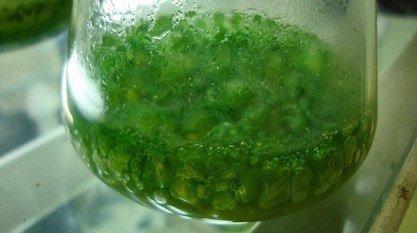 Evolution
Evolution
 Intelligent Design
Intelligent Design
New Study on the Evolution of Photosynthesis — A “Very Advanced Capability”

How exactly is evolution a fact when, as the number two science journal in the world put it, “How and when Cyanobacteria evolved the ability to produce oxygen through photosynthesis is poorly understood”?
Or as evolutionist Robert Blankenship admitted, “The whole question of the origin of cyanobacteria has long been a mystery because they kind of just appeared out of the tree of life with this very advanced capability to do oxygenic photosynthesis without any apparent forebears.”
If the cyanobacteria that do photosynthesis “just appeared” with this “very advanced capability” and “without any apparent forebears,” and if how and when they evolved photosynthesis “is poorly understood,” then just how is it that evolutionists are so certain that evolution is a fact? What am I missing here?
It is not as though photosynthesis is a tangential capability or a minor event in the “evolutionary history” of life. As the leading science writer Charles Q. Choi put it, “One of the most pivotal moments in Earth’s history was the evolution of the photosynthetic life that suffused air with the oxygen on which virtually all complex life on the planet now depends.”
Nor is it as though photosynthesis is a simple capability, in no need of explanation for how it possibly could have arisen by random mutations. Anyone who has studied photosynthesis even superficially knows it is incredibly complex. And for those who have studied in greater detail, it only gets worse. The molecular machines and their exquisite, finely-tuned, functions are truly amazing. It doesn’t “just happen.”
Even evolutionists, who are always trying to explain how easy it would be for biology’s wonders to arise by happenstance, admit to the complexity of photosynthesis. As Blankenship put it, photosynthesis is a “very advanced capability.” Similarly, Woodward Fischer agreed that the evolution of photosynthesis would be “very challenging”:
It took a substantial unfolding of evolutionary time before oxygenic photosynthesis developed, perhaps because, as we know, it was a very challenging biochemistry to develop.
Nor is it as though the evidence we do have suggests any kind of a straightforward evolutionary development of photosynthesis.
If evolution is true, then we must fire up fresh rounds of evolution’s fake news, including incredible convergences and massive horizontal, or lateral, gene transfer and fusion. Round up the usual suspects:
The phylogenetic relationships of these prokaryotes suggest that the evolution of aerobic respiration likely occurred multiple times. This, along with evidence that the modern photosynthetic system apparently arose through the lateral gene transfer and fusion of two photosynthetic systems
This is absurd. Convergence, horizontal gene transfer, and fusion are all made up mechanisms to fix the problem that the scientific evidence contradicts evolutionary theory.
But it gets worse.
Not only are evolutionists forced to draw from their army of phony explanatory mechanisms, but they are left with the proverbial “missing link.” The problem is, from where did the photosynthesis come? It couldn’t have come from the purported common ancestor via descent, and it “just appeared” with this “very advanced capability.” So evolutionists have to usher in their horizontal gene transfer story.
But from where?
From where did the incredible battery of genes — that would just happen to team up and create the all-time incredible capability of photosynthesis — come? Conveniently for evolutionists — and here’s one of the beauties of being an evolutionist — they can never know. Like Flew’s gardener, evolutionists are certain that some “missing link” organism somehow had photosynthesis up and running, or just happened to have the crucial genes just lying around, but we likely will never observe that organism because it has long since become extinct.
How convenient. Some mysterious organism did it. We’ll never know just how photosynthesis evolved because the organism where it happened has long since gone extinct, billions of years ago. Since then, it just luckily passed the technology around for other organisms to have, such as the cyanobacteria. Choi and Fischer explain:
The fact that Oxyphotobacteria possess the complex apparatus for oxygenic photosynthesis while their closest relatives do not suggests that Oxyphotobacteria may have imported the genes for photosynthesis from another organism via a process known as lateral gene transfer. It remains a mystery what the source of these genes was, “and because it happened long ago, it’s pretty likely that the group may actually have gone extinct,” Fischer said.
Photosynthesis is crucial to life and incredibly complex, evolutionists haven’t a clue how it could have evolved, it doesn’t fit the evolutionary common descent model and “just appeared” without a hint of where it came from, evolutionists are forced to make up a long just-so story to try to explain it, their story can’t be falsified because the origin of photosynthesis has long since disappeared, and on top of all this, evolutionists insist their theory is a fact, beyond all reasonable doubt.
This is like something out of a Monty Python skit. Evolution loses every battle, but manages to win the war because, after all, it’s right.
Photo: Cyanobacteria, by Joydeep (Own work) [CC BY-SA 3.0], via Wikimedia Commons.
Cross-posted at Darwin’s God.
